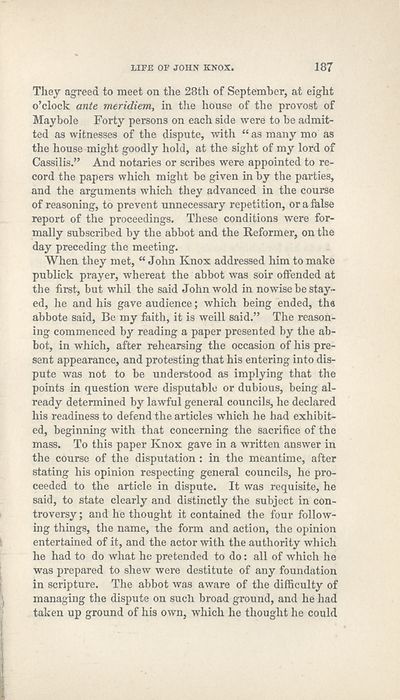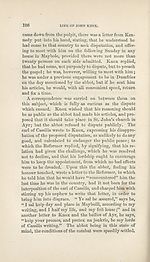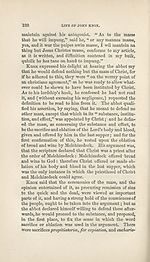Download files
Complete book:
Individual page:
Thumbnail gallery: Grid view | List view

LIFE OF JOHN KNOX.
187
They agreed to meet on the 28th of September, at eight
o’clock ante meridiem, in the house of the provost of
Maybole Forty persons on each side were to be admit¬
ted as witnesses of the dispute, with “ as many mo as
the house might goodly hold, at the sight of my lord of
Cassilis.” And notaries or scribes were appointed to re¬
cord the papers which might be given in by the parties,
and the arguments which they advanced in the course
of reasoning, to prevent unnecessary repetition, or a false
report of the proceedings. These conditions were for¬
mally subscribed by the abbot and the Reformer, on the
day preceding the meeting.
When they met, “John Knox addressed him to make
publick prayer, whereat the abbot was soir offended at
the first, but whil the said John wold in nowise be stay¬
ed, he and his gave audience; which being ended, the
abbote said, Be my faith, it is weill said.” The reason¬
ing commenced by reading a paper presented by the ab¬
bot, in which, after rehearsing the occasion of his pre¬
sent appearance, and protesting that his entering into dis¬
pute was not to be understood as implying that the
points in question were disputable or dubious, being al¬
ready determined by lawful general councils, he declared
his readiness to defend the articles which he had exhibit¬
ed, beginning with that concerning the sacrifice of the
mass. To this paper Knox gave in a written answer in
the course of the disputation: in the meantime, after
stating his opinion respecting general councils, he pro¬
ceeded to the article in dispute. It was requisite, he
said, to state clearly and distinctly the subject in con¬
troversy ; and he thought it contained the four follow¬
ing things, the name, the form and action, the opinion
entertained of it, and the actor with the authority which
he had to do what he pretended to do: all of which he
was prepared to shew were destitute of any foundation
in scripture. The abbot was aware of the difficulty of
managing the dispute on such broad ground, and he had
taken up ground of his own, which he thought he could
187
They agreed to meet on the 28th of September, at eight
o’clock ante meridiem, in the house of the provost of
Maybole Forty persons on each side were to be admit¬
ted as witnesses of the dispute, with “ as many mo as
the house might goodly hold, at the sight of my lord of
Cassilis.” And notaries or scribes were appointed to re¬
cord the papers which might be given in by the parties,
and the arguments which they advanced in the course
of reasoning, to prevent unnecessary repetition, or a false
report of the proceedings. These conditions were for¬
mally subscribed by the abbot and the Reformer, on the
day preceding the meeting.
When they met, “John Knox addressed him to make
publick prayer, whereat the abbot was soir offended at
the first, but whil the said John wold in nowise be stay¬
ed, he and his gave audience; which being ended, the
abbote said, Be my faith, it is weill said.” The reason¬
ing commenced by reading a paper presented by the ab¬
bot, in which, after rehearsing the occasion of his pre¬
sent appearance, and protesting that his entering into dis¬
pute was not to be understood as implying that the
points in question were disputable or dubious, being al¬
ready determined by lawful general councils, he declared
his readiness to defend the articles which he had exhibit¬
ed, beginning with that concerning the sacrifice of the
mass. To this paper Knox gave in a written answer in
the course of the disputation: in the meantime, after
stating his opinion respecting general councils, he pro¬
ceeded to the article in dispute. It was requisite, he
said, to state clearly and distinctly the subject in con¬
troversy ; and he thought it contained the four follow¬
ing things, the name, the form and action, the opinion
entertained of it, and the actor with the authority which
he had to do what he pretended to do: all of which he
was prepared to shew were destitute of any foundation
in scripture. The abbot was aware of the difficulty of
managing the dispute on such broad ground, and he had
taken up ground of his own, which he thought he could
Set display mode to:
![]() Universal Viewer |
Universal Viewer | ![]() Mirador |
Large image | Transcription
Mirador |
Large image | Transcription
| Antiquarian books of Scotland > Scotland/Scots > Life of John Knox ; and, The life of Alexander Henderson > (205) |
|---|
| Permanent URL | https://digital.nls.uk/131834764 |
|---|
| Description | Thousands of printed books from the Antiquarian Books of Scotland collection which dates from 1641 to the 1980s. The collection consists of 14,800 books which were published in Scotland or have a Scottish connection, e.g. through the author, printer or owner. Subjects covered include sport, education, diseases, adventure, occupations, Jacobites, politics and religion. Among the 29 languages represented are English, Gaelic, Italian, French, Russian and Swedish. |
|---|

